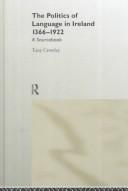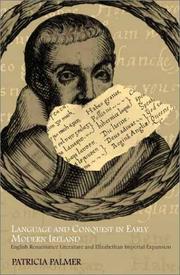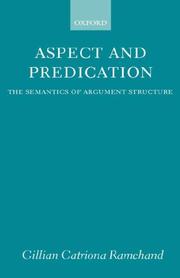| Listing 1 - 10 of 10 |
Sort by
|
Book
ISBN: 113922560X 1108048749 Year: 1867 Publisher: Place of publication not identified : Cambridge : publisher not identified, Cambridge University Press
Abstract | Keywords | Export | Availability | Bookmark
 Loading...
Loading...Choose an application
- Reference Manager
- EndNote
- RefWorks (Direct export to RefWorks)
Literally 'the war of the Irish with the foreigners', the Cogadh Gaedhel re Gallaibh is a poetic account of the Viking invasions of Ireland between 967 and 1016, and of the heroism of King Brian Bóruma. Thought to have been lost until the mid-nineteenth century, the text survives in only three manuscripts. First published in 1867 as part of the Rolls Series, this work provides a facing-page translation of the collated manuscripts. Also included are thorough notes on variations in the texts and points of linguistic interest. In his extensive introduction, the Irish scholar James Henthorn Todd (1805-69) outlines the strengths and weaknesses of each of the three manuscript copies. He sketches the history of Norwegian and Danish raids in Ireland, contextualising the chronicle and providing a summary of its contents. The work still represents an important resource in Celtic studies, and among philologists studying Middle Irish.
Irish language --- Northmen --- Ireland --- History --- Norsemen --- Ethnology --- Erse language --- Gaelic language, Irish --- Irish Gaelic language --- Goidelic languages --- Irish Free State --- Brian, --- Brianus,
Periodical
ISSN: 20090056 Year: 1904 Publisher: Dublin : School of Irish Learning : Hodges, Figgis, & Co.,
Abstract | Keywords | Export | Availability | Bookmark
 Loading...
Loading...Choose an application
- Reference Manager
- EndNote
- RefWorks (Direct export to RefWorks)
Irish language --- Irish literature --- Celtic languages --- Celtic languages. --- Irish language. --- Irish literature. --- Erse language --- Gaelic language, Irish --- Irish Gaelic language --- British literature --- Goidelic languages --- Language and languages --- Celtic philology --- Indo-European languages
Book
ISBN: 9516531156 9789516531154 Year: 1983 Volume: 73(1981) Publisher: Helsinki Societas scientiarum Fennica
Abstract | Keywords | Export | Availability | Bookmark
 Loading...
Loading...Choose an application
- Reference Manager
- EndNote
- RefWorks (Direct export to RefWorks)
Linguistics --- Irish language --- Civilization, Celtic --- History --- Texts --- Sources --- Auraicept na n-éces --- -Civilization, Celtic --- -Irish language --- -Erse language --- Gaelic language, Irish --- Irish Gaelic language --- Goidelic languages --- Celtic civilization --- Celts --- Linguistic science --- Science of language --- Language and languages --- Civilization --- History. --- Texts. --- Sources. --- Auraicept na n-éces. --- -History --- Erse language --- Auraicept na n-éces. --- Auraicept na nEces. --- Iers (Oud-). Spraakkunst. Geschiedenis. (Leerstellige). --- Grammaire. Histoire. Irlande. 5e-15e s. --- Irlandais [Langue] ancien. Grammaire. Histoire doctrinale. --- Spraakkunst. Geschiedenis. Ierland. 5e-15e eeuw. --- Linguistics - Ireland - History --- Irish language - To 1100 - Texts --- Civilization, Celtic - Sources
Periodical
Abstract | Keywords | Export | Availability | Bookmark
 Loading...
Loading...Choose an application
- Reference Manager
- EndNote
- RefWorks (Direct export to RefWorks)
Irish language --- Irish literature --- Irish language. --- Irish literature. --- Erse language --- Gaelic language, Irish --- Irish Gaelic language --- Irish-language sociolinguistics --- Irish language and literature --- Irish studies --- traditional song and folklore --- contemporary Irish language literature --- literary and cultural criticism --- British literature --- Goidelic languages --- Language and languages --- Celtic Languages & Literatures --- irish-language sociolinguistics --- irish language and literature --- irish studies --- contemporary irish language literature

ISBN: 0415157188 041515717X 1134729022 1280105186 0203005929 9780203005927 9780415157179 9780415157186 1134729014 9781134729012 9781134729029 9781280105180 Year: 2000 Publisher: London New York Routledge
Abstract | Keywords | Export | Availability | Bookmark
 Loading...
Loading...Choose an application
- Reference Manager
- EndNote
- RefWorks (Direct export to RefWorks)
Providing direct access to original texts, this is an historical resource book which can be used as a case study in the relations between language and cultural identity.
English language --- Irish language --- Language policy --- #KVHA:Diachronie; Engels --- #KVHA:Taalpolitiek; Ierland --- Glottopolitics --- Institutional linguistics --- Language and languages --- Language and state --- Languages, National --- Languages, Official --- National languages --- Official languages --- State and language --- Communication policy --- Language planning --- Erse language --- Gaelic language, Irish --- Irish Gaelic language --- Goidelic languages --- Germanic languages --- Political aspects --- History --- Government policy --- Ireland --- Irish Free State --- Politics and government --- POLITIQUE LINGUISTIQUE --- IRLANDE

ISBN: 1107122155 1280162201 0511119143 0511047258 0511154208 0511303610 0511483856 0511041292 9780511041297 9780511119149 9780521793186 0521793181 9780511483851 9780511047251 9780521120333 0521120330 9781107122154 9781280162206 9780511154201 9780511303616 Year: 2001 Publisher: Cambridge New York Cambridge University Press
Abstract | Keywords | Export | Availability | Bookmark
 Loading...
Loading...Choose an application
- Reference Manager
- EndNote
- RefWorks (Direct export to RefWorks)
The Elizabethan conquest of Ireland sparked off two linguistic events of enduring importance: it initiated the language shift from Irish to English, which constitutes the great drama of Irish cultural history, and it marked the beginnings of English linguistic expansion. The Elizabethan colonisers in Ireland included some of the leading poets and translators of the day. In Language and Conquest in Early Modern Ireland, Patricia Palmer uses their writings, as well as material from the State Papers, to explore the part that language played in shaping colonial ideology and English national identity. Palmer shows how manoeuvres of linguistic expansion rehearsed in Ireland shaped Englishmen's encounters with the languages of the New World, and frames that analysis within a comparison between English linguistic colonisation and Spanish practice in the New World. This is an ambitious, comparative study, which will interest literary and political historians.
English literature --- English language --- British --- Irish language --- Language policy --- Imperialism in literature. --- Renaissance --- Erse language --- Gaelic language, Irish --- Irish Gaelic language --- Goidelic languages --- Germanic languages --- History and criticism. --- Political aspects --- History --- Political aspects. --- Ireland --- Irish Free State --- Foreign public opinion, English --- Historiography. --- In literature. --- Languages. --- Arts and Humanities --- Literature --- Communication policy --- Language planning
Book

ISBN: 1474420672 1474420664 9781474420662 9781474420679 9781474420655 1474420656 1474420656 9781474420655 Year: 2022 Publisher: Edinburgh
Abstract | Keywords | Export | Availability | Bookmark
 Loading...
Loading...Choose an application
- Reference Manager
- EndNote
- RefWorks (Direct export to RefWorks)
New perspectives on the use and acquisition of a minority language. The number of young people speaking Gaelic in Scotland is growing for the first time since Census records began but less than half of all Gaelic speakers use Gaelic in the home. This book sets out to explore why. Focusing on how people, communities and organisations are 'doing' Gaelic, this book explores the processes and patterns of Gaelic language acquisition, use and management across four key spaces of interaction: the family, the community, educational settings, and in organisations. The contributors adopt an experiential approach to give voice to speakers in a diverse range of communities, both geographically and socially, as the volume illustrates the ways in which the use of Gaelic is changing in the context of increasingly fragmented, networked communities. Gaelic in Contemporary Scotland provides a range of critical perspectives on existing models for minority language revitalisation and to introduce fresh ideas for language revitalisation theory. Through its analysis of the interconnections between, and differences within, Gaelic communities, this collection challenges old understandings of the Gaelic community as a single collective identity, making it an invaluable resource for students, lecturers and researchers interested in questions of linguistic diversity, linguistic minorities and language policy and planning.
Scottish Gaelic language --- Linguistic minorities --- Endangered languages --- At-risk languages --- Disappearing languages --- Dying languages --- Fading languages --- Nearly extinct languages --- Threatened languages --- Vanishing languages --- Language and languages --- Language obsolescence --- Minority languages --- Minorities --- Sociolinguistics --- Erse language --- Gaelic language --- Gaelic language, Scots --- Gaelic language, Scottish --- Scots Gaelic language --- Scottish language (Celtic) --- Goidelic languages --- Social aspects. --- Political aspects --- Gälisch-Schottisch. --- Usage. --- Schottland. --- Minoritized languages
Periodical
ISSN: 0332205X 25656325 Year: 1979 Publisher: Dublin : IRAAL,
Abstract | Keywords | Export | Availability | Bookmark
 Loading...
Loading...Choose an application
- Reference Manager
- EndNote
- RefWorks (Direct export to RefWorks)
applied linguistics --- language acquisition --- pragmatics --- bilingualism --- language policy --- irish language --- Irish language --- Applied linguistics --- Applied linguistics. --- Irish language. --- Erse language --- Gaelic language, Irish --- Irish Gaelic language --- Goidelic languages --- Linguistics --- Irish Association for Applied Linguistics --- Irish Association for Applied Linguistics. --- Cumann na Teangeolaíochta Feidhmí --- IRAAL --- Ireland. --- Airlann --- Airurando --- Éire --- Irish Republic --- Irland --- Irlanda --- Irlande --- Irlanti --- Írország --- Poblacht na hÉireann --- Republic of Ireland --- Language and languages --- Irlandais (Langue) --- Linguistique appliquée

ISBN: 0198236514 9780198236511 Year: 1997 Publisher: Oxford Clarendon
Abstract | Keywords | Export | Availability | Bookmark
 Loading...
Loading...Choose an application
- Reference Manager
- EndNote
- RefWorks (Direct export to RefWorks)
This book investigates the systematic correspondences between syntactic structure and semantic interpretation in the domain of predicate-argument relationships. Taking Scottish Gaelic as its empirical base, the book provides a detailed working out of a semantic system of argument classification which moves away from lexically-driven thematic roles in the traditional sense and towards a more constrained, syntactically motivated, set of primitives.
Lexicology. Semantics --- Grammar, Comparative and general --- -Grammar, Comparative and general --- -Semantics --- Scottish Gaelic language --- -Scottish Gaelic --- 801.56 --- Erse language --- Gaelic language --- Gaelic language, Scots --- Gaelic language, Scottish --- Scots Gaelic language --- Scottish language (Celtic) --- Goidelic languages --- Formal semantics --- Semasiology --- Semiology (Semantics) --- Comparative linguistics --- Information theory --- Language and languages --- Lexicology --- Meaning (Psychology) --- Comparative grammar --- Grammar --- Grammar, Philosophical --- Grammar, Universal --- Philosophical grammar --- Linguistics --- Philology --- Aspect --- Syntax --- Verb phrase --- 809.163 --- Syntaxis. Semantiek --- Grammar, Comparative --- Semantics. --- Aspect. --- Syntax. --- Verb phrase. --- Grammar. --- 801.56 Syntaxis. Semantiek --- Semantics --- Scottish Gaelic --- Predicate (Grammar) --- Aspect (Linguistics) --- Phrasal verb --- Predicate --- Verbals --- Verbal aspect --- Temporal constructions --- Verb --- Grammar, Comparative and general Syntax
Book
ISBN: 3642305571 9786613942869 364230558X 1283630419 Year: 2012 Publisher: Heidelberg : Springer,
Abstract | Keywords | Export | Availability | Bookmark
 Loading...
Loading...Choose an application
- Reference Manager
- EndNote
- RefWorks (Direct export to RefWorks)
This white paper is part of a series that promotes knowledge about language technology and its potential. It addresses educators, journalists, politicians, language communities and others. The availability and use of language technology in Europe varies between languages. Consequently, the actions that are required to further support research and development of language technologies also differ for each language. The required actions depend on many factors, such as the complexity of a given language and the size of its community. META-NET, a Network of Excellence funded by the European Commission, has conducted an analysis of current language resources and technologies. This analysis focused on the 23 official European languages as well as other important national and regional languages in Europe. The results of this analysis suggest that there are many significant research gaps for each language. A more detailed expert analysis and assessment of the current situation will help maximise the impact of additional research and minimize any risks. META-NET consists of 54 research centres from 33 countries that are working with stakeholders from commercial businesses, government agencies, industry, research organisations, software companies, technology providers and European universities. Together, they are creating a common technology vision while developing a strategic research agenda that shows how language technology applications can address any research gaps by 2020.
Computational linguistics. --- Language translation and linguistics. --- Translators (Computer programs). --- Irish language --- Computational linguistics --- Natural language processing (Computer science) --- Languages & Literatures --- Celtic Languages & Literatures --- Philology & Linguistics --- Data processing --- Irish language. --- Erse language --- Gaelic language, Irish --- Irish Gaelic language --- Automatic language processing --- Language and languages --- Language data processing --- Linguistics --- Natural language processing (Linguistics) --- Computer science. --- Computer Science. --- Language Translation and Linguistics. --- Computational Linguistics. --- Goidelic languages --- Applied linguistics --- Cross-language information retrieval --- Mathematical linguistics --- Multilingual computing --- Natural language processing (Computer science). --- Natural Language Processing (NLP). --- NLP (Computer science) --- Artificial intelligence --- Electronic data processing --- Human-computer interaction --- Semantic computing
| Listing 1 - 10 of 10 |
Sort by
|

 Search
Search Feedback
Feedback About UniCat
About UniCat  Help
Help News
News